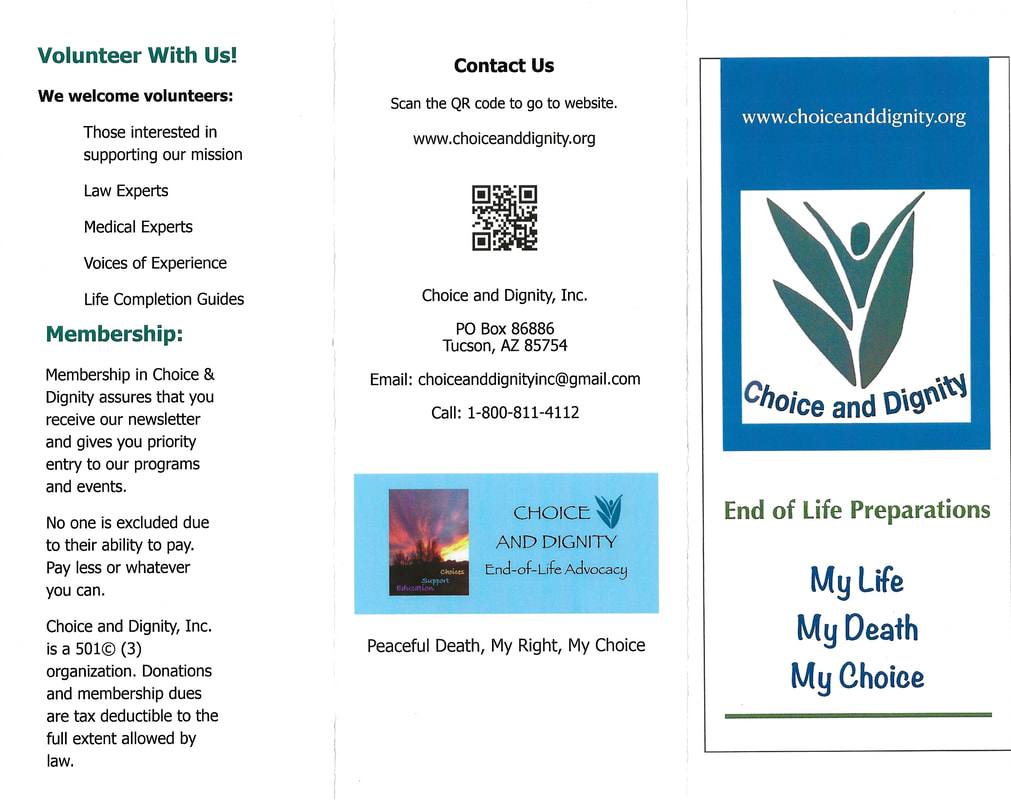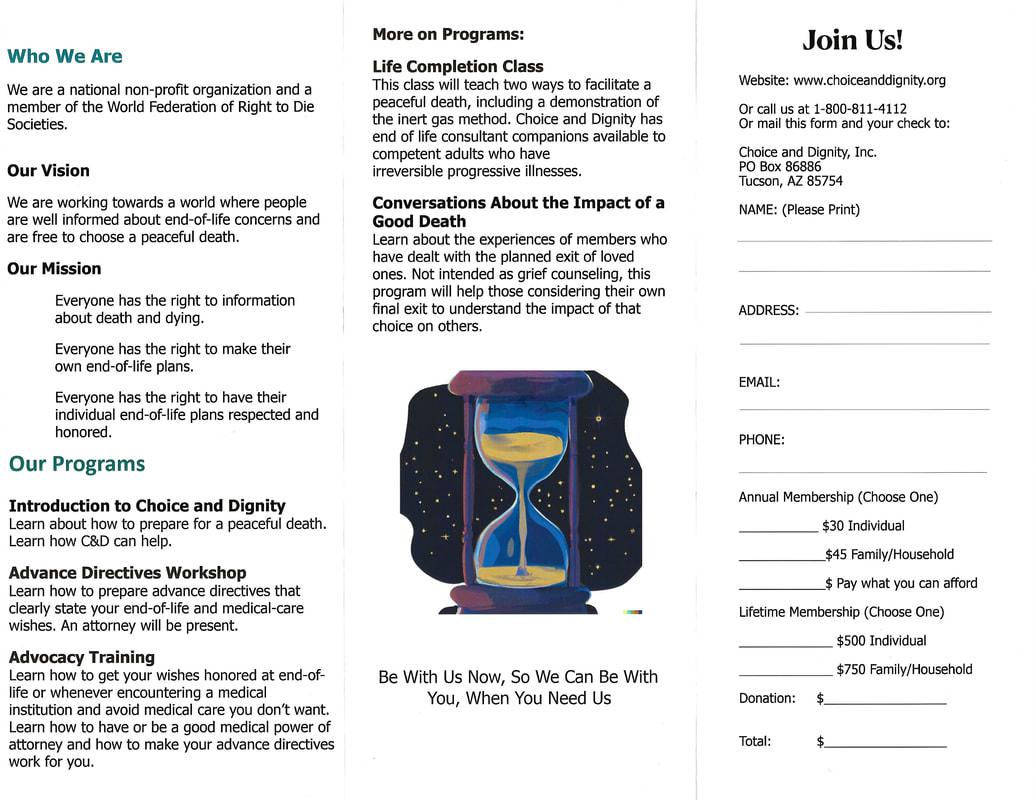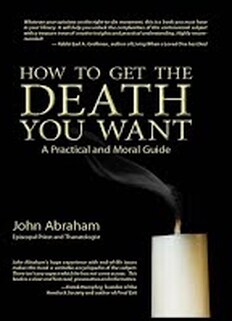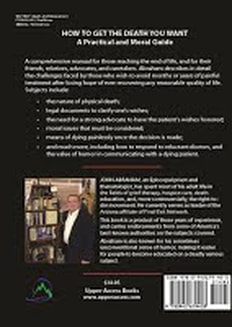Choice and Dignity in the news
Materials
Our Brochure
If you would like to have some of these to share with friends and family, or leave in waiting rooms, please call 1-800-811-4112. You may also download the brochure.
If you would like to have some of these to share with friends and family, or leave in waiting rooms, please call 1-800-811-4112. You may also download the brochure.
| brochure_front_0223.pdf | |
| File Size: | 943 kb |
| File Type: | |
| |||||||
Let's talk about Death with John Abraham
In this episode, John talks about his work with Choice and Dignity, a right to die nonprofit organization offering end-of-life advocacy to enable everyone to have a “good death.”
John Abraham, Episcopal Priest, and Certified Fellow in Thanatology has 40+ years working in death education as a counselor, therapist, patient-care advocate, and health care administrator. He is the author of How To Get the Death You Want: A Practical And Moral Guide (2017) and of many articles in OMEGA – Journal of Death and Dying and numerous journals, newsletters, magazines, and newspapers, reflecting his commitment to the disciplines of death, dying, and bereavement. Mr. Abraham approaches these topics with a holistic perspective, taking into account the physical, psychological, and spiritual dimensions of these challenging issues. He speaks and presents to doctors, nurses, general medical staff, assisted-living workers, educators, hospices, community and religious groups, emergency caregivers, etc.
John is the founder and past-president of Choice and Dignity, Inc. Our website provides support and information about life’s end and how to avoid the “bad death” that many people experience, enabling everyone to obtain a “good death.” He is a graduate of The Peddie School, Colgate University, and Virginia Theological Seminary, and is committed to continuing education through various venues. He has taught Death Education to undergraduates and presently teaches adults through the University of Arizona’s Adult Education Program.
John Abraham, Episcopal Priest, and Certified Fellow in Thanatology has 40+ years working in death education as a counselor, therapist, patient-care advocate, and health care administrator. He is the author of How To Get the Death You Want: A Practical And Moral Guide (2017) and of many articles in OMEGA – Journal of Death and Dying and numerous journals, newsletters, magazines, and newspapers, reflecting his commitment to the disciplines of death, dying, and bereavement. Mr. Abraham approaches these topics with a holistic perspective, taking into account the physical, psychological, and spiritual dimensions of these challenging issues. He speaks and presents to doctors, nurses, general medical staff, assisted-living workers, educators, hospices, community and religious groups, emergency caregivers, etc.
John is the founder and past-president of Choice and Dignity, Inc. Our website provides support and information about life’s end and how to avoid the “bad death” that many people experience, enabling everyone to obtain a “good death.” He is a graduate of The Peddie School, Colgate University, and Virginia Theological Seminary, and is committed to continuing education through various venues. He has taught Death Education to undergraduates and presently teaches adults through the University of Arizona’s Adult Education Program.
Books
"How to Get the Death You Want - A Practical and Moral Guide" by John Abraham, M.Div., F.T., Thanatologist.
Available on Amazon. Also available at our programs and events. More information here
"Final Exit 2020" by Derek Humphry, founder of the Hemlock Society. Only available digitally.
"The Peaceful Pill Handbook" Available here
Available on Amazon. Also available at our programs and events. More information here
"Final Exit 2020" by Derek Humphry, founder of the Hemlock Society. Only available digitally.
"The Peaceful Pill Handbook" Available here
Useful websites
Suicide Prevention Resources
https://sprc.org/
or Dial 988
A great collection of resources for depression:
www.columbusrecoverycenter.com/depression-resource-guide/
www.therecoveryvillage.com/mental-health/depression/depression-hotlines/
Other Organizations working towards Death with Dignity
Final Exit Network
ERGO (Euthanasia Research & Guidance Organization)
Death with Dignity Meet Up Group
Exit International
Tucson Death Café
The Hemlock Society of San Diego
World Federation of Right to Die Societies
Association for Death Education and Counseling (ADEC)
Resources to help you talk to your loved ones and medical professionals about your wishes.
The Conversation Project
Resources for End-of-Life Arrangements
The Funeral Consumers Alliance of Arizona is a nonprofit, trusted, objective source of information to help you navigate end of life arrangements.
Disease Specific Resources
https://www.asbestos.com/support/end-of-life-documents/
Coping with Cancer
IRISVISION helps the visually impaired community see clearly and live fully
https://myvision.org/guides/mental-health
https://sprc.org/
or Dial 988
A great collection of resources for depression:
www.columbusrecoverycenter.com/depression-resource-guide/
www.therecoveryvillage.com/mental-health/depression/depression-hotlines/
Other Organizations working towards Death with Dignity
Final Exit Network
ERGO (Euthanasia Research & Guidance Organization)
Death with Dignity Meet Up Group
Exit International
Tucson Death Café
The Hemlock Society of San Diego
World Federation of Right to Die Societies
Association for Death Education and Counseling (ADEC)
Resources to help you talk to your loved ones and medical professionals about your wishes.
The Conversation Project
Resources for End-of-Life Arrangements
The Funeral Consumers Alliance of Arizona is a nonprofit, trusted, objective source of information to help you navigate end of life arrangements.
Disease Specific Resources
https://www.asbestos.com/support/end-of-life-documents/
Coping with Cancer
IRISVISION helps the visually impaired community see clearly and live fully
https://myvision.org/guides/mental-health
The Trouble with Physical Aid in Dying (PAD)
The 8 States that have PAD or Medical Aid in Dying (MAID) all have legislation based on the same grossly inadequate model!
First, one must be terminally ill. Usually, by the time two doctors proclaim terminal illness, the patient practically has one foot in the grave! By including the terminal criteria such PAD or MAID laws exclude many who may wish to hasten their deaths due to hopeless and interminable suffering experienced far in advance of being arbitrarily deemed "terminal," such as those with early stage Alzheimer's Disease, progressive disorders such as ALS or MS, and much more. Those with dementia may have to wait until it is too late, being diagnosed as incompetent to give informed consent for PAD. Moreover, is the term "terminal" always justly applied? I have a friend whose mother in a nursing home was in enormous suffering and withered away to weighing only fifty-eight pounds, and yet the doctors refused to declare that she was "terminal." It would be best if we were to terminate "terminal" from such legislation!
And it is difficult to find physicians who will comply, even though it is legal. Whole hospital chains have opted out, and many doctors just will not participate. One couple in New Jersey called over 40 doctors, none of whom would assist them!
Choice and Dignity DOES support those who are not necessarily terminally ill! John Abraham
-------
Anita Hannig, a medical anthropologist at Brandeis University, wrote this:
Every year, dozens of eligible patients who apply for an assisted death are so close to the end of their life that they die during the mandated waiting period. And by the time a patient becomes eligible for an assisted death, they may have missed the window when they are able to ingest the lethal medication. In contrast to their Canadian, Dutch and Belgian colleagues, American physicians cannot administer these drugs to their patients.
Despite popular backing for medical assistance in dying – seven in 10 Americans support it – the cultural stigma and moral ambivalence around these laws remain potent. Across the country, many religiously owned health systems decline to participate in their state’s assisted dying law.
In rural parts of Oregon and along the coastal corridor, where Catholic health systems often run the only hospital in town, patients routinely struggle to find two physicians who will approve their request, or a pharmacist who will fill their prescription. Many hospices refuse to cooperate with a patient’s desire to seek an assisted death, leading patients to feel abandoned. Many assisted living and nursing facilities still prohibit the practice under their roof, forcing patients to make alternative arrangements, sometimes at a nearby motel. In trying to reclaim control over the way they die, these patients often are being stripped of some of that control in the process.
Assisted dying reframes how we, as a society, understand the potential of medicine, not as a way to extend life but to mitigate the process of dying. Patients who endure intractable, painful diseases sometimes reach a moment when the prospect of staying alive feels worse than the prospect of dying. At that point, the idea of having a say over the timing and manner of their death can bring enormous comfort. But few are aware of all the hurdles they must clear to exercise this kind of control.
The 8 States that have PAD or Medical Aid in Dying (MAID) all have legislation based on the same grossly inadequate model!
First, one must be terminally ill. Usually, by the time two doctors proclaim terminal illness, the patient practically has one foot in the grave! By including the terminal criteria such PAD or MAID laws exclude many who may wish to hasten their deaths due to hopeless and interminable suffering experienced far in advance of being arbitrarily deemed "terminal," such as those with early stage Alzheimer's Disease, progressive disorders such as ALS or MS, and much more. Those with dementia may have to wait until it is too late, being diagnosed as incompetent to give informed consent for PAD. Moreover, is the term "terminal" always justly applied? I have a friend whose mother in a nursing home was in enormous suffering and withered away to weighing only fifty-eight pounds, and yet the doctors refused to declare that she was "terminal." It would be best if we were to terminate "terminal" from such legislation!
And it is difficult to find physicians who will comply, even though it is legal. Whole hospital chains have opted out, and many doctors just will not participate. One couple in New Jersey called over 40 doctors, none of whom would assist them!
Choice and Dignity DOES support those who are not necessarily terminally ill! John Abraham
-------
Anita Hannig, a medical anthropologist at Brandeis University, wrote this:
Every year, dozens of eligible patients who apply for an assisted death are so close to the end of their life that they die during the mandated waiting period. And by the time a patient becomes eligible for an assisted death, they may have missed the window when they are able to ingest the lethal medication. In contrast to their Canadian, Dutch and Belgian colleagues, American physicians cannot administer these drugs to their patients.
Despite popular backing for medical assistance in dying – seven in 10 Americans support it – the cultural stigma and moral ambivalence around these laws remain potent. Across the country, many religiously owned health systems decline to participate in their state’s assisted dying law.
In rural parts of Oregon and along the coastal corridor, where Catholic health systems often run the only hospital in town, patients routinely struggle to find two physicians who will approve their request, or a pharmacist who will fill their prescription. Many hospices refuse to cooperate with a patient’s desire to seek an assisted death, leading patients to feel abandoned. Many assisted living and nursing facilities still prohibit the practice under their roof, forcing patients to make alternative arrangements, sometimes at a nearby motel. In trying to reclaim control over the way they die, these patients often are being stripped of some of that control in the process.
Assisted dying reframes how we, as a society, understand the potential of medicine, not as a way to extend life but to mitigate the process of dying. Patients who endure intractable, painful diseases sometimes reach a moment when the prospect of staying alive feels worse than the prospect of dying. At that point, the idea of having a say over the timing and manner of their death can bring enormous comfort. But few are aware of all the hurdles they must clear to exercise this kind of control.



